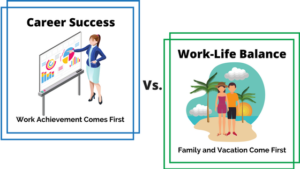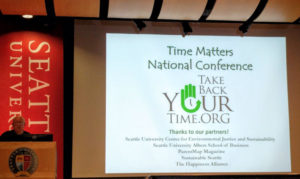Have you calculated your vacation days and realized it just isn’t enough? Do you travel a lot for business, expect to start a family soon, or desire a more flexible schedule? These 5 time off maximizing tips are here to help you go beyond these common vacation limitations. Learn how to supersize your time off from work!

Earning time off flexibility requires that you talk to people, ask the right questions, and gain approval. Be careful not to raise this issue in a demanding or entitled way, but as an employee that wants to understand the fine-print and gray area of your HR benefits.
Try out these ideas once you are well established and a proven success at your current job. These tips are best suited to experienced employees and not typically for entry-level or new hires. It should come as no surprise that you are more likely to be granted flexibility and vacation leeway when you are someone who can be trusted with it.
1. Ask Your Co-Workers for Vacation Time-Off Tips

After you have reviewed the employee handbook and talked to HR staff to fully understand the documented time off policies, turn to your co-workers. The people who work in your company may have knowledge of the internal, often unwritten rules to request and get approval for the most popular vacation days of the year. They are also a great source of examples as to how to request flex-time, time off without pay, rolling over vacation days, and other special requests. Let them lay the groundwork for expanding the definition of taking time off and then follow in their footsteps.
The first step is to ask your direct co-workers and colleagues for their advice and personal experience. They’ll know what periods of the year are ideal for taking vacations and who to talk to when you have an unusual time off request. Ask if they have any examples of when they took vacation days in a way that was outside of the written policy. How did they go about getting management or HR approval?
For those of you who work for a large corporation, consider the possibility of posting a message to the company intranet or internal group mailing list to seek more widespread time-off tips. However be prudent when posting to a message board that is publicly available to all employees. Ask the type of general questions that all employees can relate to and want to learn more about.
When you attend company events and get to work with others outside of your immediate team, bring up the topic of vacation policy. Here are some issues and areas of discussion to consider:
- How much vacation are people getting versus taking?
- Do they have trouble getting paid vacation days off approved?
- How do their teams coordinate time off so that overall productivity doesn’t suffer?
- How are work-life balance challenges addressed in different departments?
- Are there examples of flextime (flexible workdays) that have proven to be a success?
I suggest making connections (maybe even friends) with work colleagues who are successful at their job and at maximizing their vacation days. At the same time, watch out for those hard-working, but often misguided Americans who fail to take every vacation day before the year is up. You don’t want to emulate that habit!
2. Success Milestone Time Off Rewards

Every job has goals, deadlines, and success metrics. During certain times of the year we all have to work a bit harder to increase sales, ship a product, complete a project, or simply deal with the crush of customers. When this milestone has passed and the outcome was a success, does your employer give bonus vacation time off?
You put in your part by working extra hard and most likely extra hours. It was probably both stressful and exhilarating, but when you got the job done don’t you deserve to share in the rewards? Now if you are paid by the hour you are entitled to overtime pay. This time-off negotiation tip is meant for salaried employees who do not qualify for overtime pay. Regardless of whether this is fair or not, you absolutely deserve extra compensation even if it is not required by law.
It makes perfect sense in my book to receive an extra afternoon off to take care of your own needs or better yet, an extra vacation day or two in return for your dedication. Bonus vacation days for overtime probably won’t appear in the employee handbook. That is why you must cautiously and subtly ask around as to what was done in the past. Are there regular crunch times when everyone is expected to dig deep to bring the company greater success? You should be compensated for all this hard work, especially if you sacrificed your own free time for your employer. In my own past jobs I’ve occasionally been offered a cash bonus or gift item when putting in overtime which is unpaid.
However wouldn’t it be so much better for your manager to offer an equivalent amount of vacation time off work instead? When you value time off over money and gifts, talk to your employer and make your preference for vacation rewards clear. If it can’t happen this time, perhaps next time around you and your colleagues will be offered a choice of bonus money or time. You can be the one that earns an extra vacation day for your extraordinary contribution of time, productivity, and commitment to your employer’s bottom line.
3. Vacation After Having a Baby

The policy on maternity leave and pay is mostly determined by the laws in your home state and country. In the U.S. at least, receiving paid time off and benefits for having a baby (beyond the minimum) is largely determined by the generosity of your employer. The U.S. Family Medical Leave Act stipulates unpaid leave of up to 12 weeks. European countries are a lot more generous, but you are not likely to move abroad before you have a child.
You may be forced to combine vacation, sick, and personal days when having a child, thereby using up all of your paid time off if needs be. A common option is to be given short-term disability leave after the baby is born. This means you can earn a portion of your pay while taking the time off you absolutely require after childbirth. For new Dad’s, your options may be more limited.
The first question you should get answered is if and how you are allowed to combine maternity or paternity leave with other paid time off. Talk to your HR representative to determine the rules of using vacation days during this major life event. Some companies have limitations as to how many consecutive days you can take off all at once.
Depending upon your childbirth circumstances and date of birth (early in the year or late in the year), you may be able to take a vacation sooner rather than later. While you’ll likely have to burn all your accrued vacation days for this huge life event, you’ll start earning more vacation days right away.
Do you earn a set number of days per pay period or month or do you get a block of vacation days at the start of the new year? That will determine how quickly you can earn back enough vacation days to spend with your new family member. Do a bit of calculation to figure out when your first family vacation together can be scheduled. What will you do on a vacation or staycation as a bonding experience with your spouse, new baby, family, and friends?
4. Business Trip Overtime Days Off In Lieu

Going on a business trip can be both hard work and fun. A lot depends on the destination and how much free time you have outside normal business hours. So what if you have to travel, meet clients, and work during the weekend or evenings? Do you automatically get “make up” time off in exchange for working beyond a typical 8-hour workday?
Hopefully your company has an official policy on what happens when you work overtime when traveling on business (see: bleisure travel policies). Use that pay benefit to your own vacation benefit. For example you may decide that it is optimal to travel or fly on a Sunday to arrive in time for a sales meeting on a Monday morning. Getting an extra “free” to use as you like day off can be a great way to increase your vacation time during other parts of the year. Will your employer allow this?
The same thinking applies to working evenings to attend company and industry events. Can you add up those extra hours (even if you are having fun like at a business dinner) and turn them into a half or full vacation day at a time of your choosing? You may want to ask your colleagues for advice before speaking with your boss. From my experience receiving time-off-in-lieu in the form of a half or full vacation day is often done off the books (not official). So it may be between you and your manager to track and take make-up days off.
Also research whether there are employment laws in your state (U.S. Departments of Labor) or country that deals with overtime pay. Find out when you must be legally compensated for business travel, overtime hours, and related expenses. Belonging to a union and being an hourly staff member versus salaried employee makes it more likely that you are covered by these laws, so do your homework to be certain.
5. Arrive Late or Leave Early Workshifting

Not everyone has to work a 9 to 5, 8:30-5:30, or even 8-6 day! Can your working hours (start and end times) be more flexible? Will your boss let you come in slightly later in the morning and leave after everyone has gone home? Or is it possible to be the first to arrive at the office in order to leave an hour or two early? Ask about shifting your work schedule to have more free hours in the early morning or late afternoon to do with as you wish.
Now you might not feel comfortable shifting your working hours every workday, so try it out as an experiment on select days with the approval of your manager. Getting up early could mean less sleep and commuting in the dark . Working late might cause you to miss out on after work activities with colleagues and friends. However you may gain even more time back by avoiding peak commute hours in the U.S. plus the stress that goes with it.
Think about what you can do with a few at-your-leisure hours of daytime or late afternoon time. Remember that vacation time is any time away from work and life to do whatever you choose. You could take a creative arts or foreign language class, volunteer your morning in the community, or enjoy an early bird dinner with someone special. During the winter months consider an outdoor activity before it gets dark so early. How about visiting tourist attractions or going shopping without the weekend crowds? It’s up to you if you can flex your work shift in your favor.
Always Be Supersizing Your Vacation Benefits
These are just some of the smart ways in which you can take the limited vacation benefits you’re granted at work to use them to your advantage. Unless you change jobs or the benefits at your company changes drastically all of a sudden, you are stuck the time-off policy you are given. Turn to VacationCounts for continuing coverage of vacation hacks so that you can optimize your work-life-vacation balance now and throughout your career.
Add your own advice and experience below to the comments box to share with the community. How have you taken a vacation after having a child, turned overtime into vacation, discovered insider tips from your part-time traveling peers, shifted your workday to free up hours in the day, or took back your business travel time for personal use?
Royalty-free photos about work-life balance licensed from Dreamstime.com






